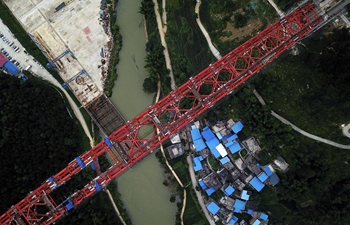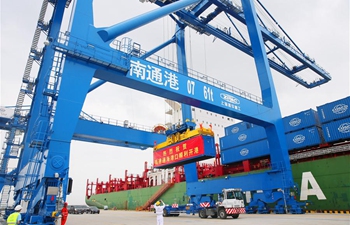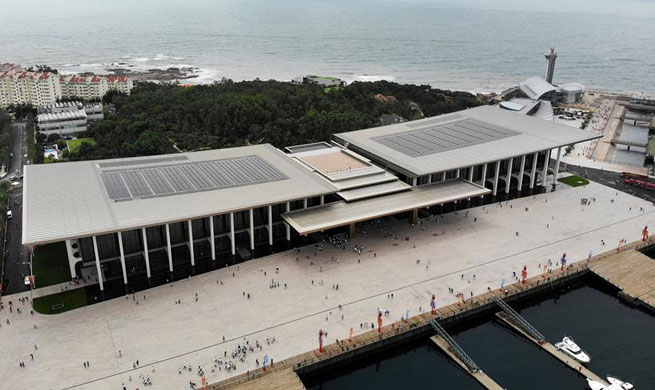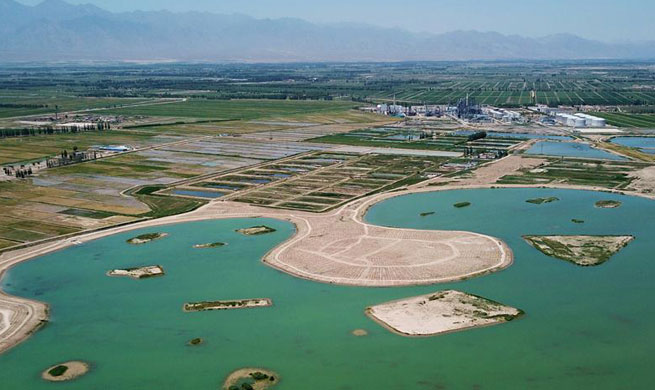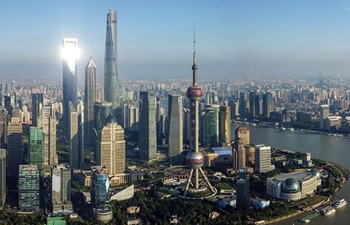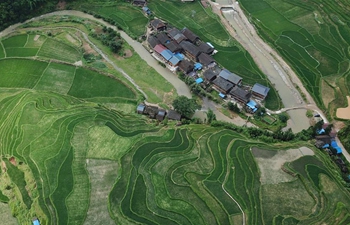by Xinhua writer Han Song
GUIYANG, July 1 (Xinhua) -- China's poverty reduction program is attracting new participants -- science fiction writers.
Just days before its first anniversary, fifteen sci-fi writers from China, the United States and Canada went to Wanda Town, a Wanda Group poverty alleviation project in the southwestern province of Guizhou, to collect material for new stories.
Wanda executive Wei Wei, one of the organizers of the trip, described China's poverty alleviation program, the most ambitious attempt ever to raise the living standards of millions of people, as a great source of sci-fi inspiration.
Wanda, a real estate conglomerate, has contributed two billion yuan (about 320 million U.S. dollars) to poverty-stricken county Danzhai, much of which has been spent on theme park Wanda Town. The theme in question is the culture and history of the Miao ethnic group and the park has attracted five million tourists and investors worldwide since it opened on July 3 last year.
China is home to more than nine million Miao, who live in mainly in Guizhou, Hunan and Yunnan provinces. In Southwest Asia and North America, they are called Hmong. The people became widely known in the West when they were featured in the Clint Eastwood movie, Gran Torino. There is a claimed genetic relationship between Hmong-Miao peoples and Mon-Khmer people dating back 18,000 years. The Miao have distinctive language, architecture, clothing and religious rituals.
TOILING IN THE TEA GARDEN
The writers were invited to pick tea. The fifteen managed to collected just 100 grams of tea between them in half and hour, a bounty worth the astonishing total of three yuan (about 50 U.S. cents).
"The job's difficulty is beyond any sci-fi writer's imagination. We should invent a machine to do it, " said Jiang Bo from Shanghai, and winner of China's Galaxy award.
"The facial recognition technology could be used in tea picking," said Derek Kunsken from Canada, winner of the Asimov readers award.
"I heard that the local women chew the leaves to test the quality. A machine could also do that," said young sci-fi writer Liang Qingsan from Beijing.
The tea garden was built by Wanda as a gift for farmers whose annual per capita income used to be a mere 360 yuan (about 60 U.S. dollars). Now, they each make around ten times that amount. These 1,000 tea-growers are just a tiny fraction of the 700 million rural people to have been raised out of poverty over the past 40 years. The 40 million who remain below the national poverty line are to be freed from their destitution by 2020.
The writers discussed the possibility of creating a new sci-fi genre "Danzhai Punk" to promote local tea and other agricultural products. However, Kunsken worried that the introduction of machines would deprive low-skilled people of their jobs. Sci-fi writers should design futuristic mechanisms such as "life-long loans" or "universal income" to guarantee their basic needs, he said.
When visiting a plant where craftsmen still make paper by hand as their ancestors did 1,000 years ago, Lawrence Schoen from the United States was surprised to find a unique substance. A brush dipped in a cup of water can then be used to write on a cloth-like sheet and somehow render characters as if in black ink.
"I think they'd be perfect for Klingon speakers who want to practice writing Klingon characters," said the Hugo award winner and a member of the board of the Science Fiction and Fantasy Writers of America. He wondered if he would find the "Water Writing Cloth" on Amazon so he could order them in time for the 25th Klingon Language Conference in July.
The Klingon is an artificial language used by Klingons, fictional extraterrestrial humanoid warrior species in the science fiction franchise Star Trek. In the real world, it is spoken by many Star Trek fans.
Pan Yuhua, owner of the paper factory, said he was happy to enable rural people to earn more but also to make a contribution to civilizations across the universe.
REVERSING HISTORY
On the way to visit an abandoned mercury plant built in the 1950s with the help of the Soviet Union, Jiang Bo and Bao Shu discussed what would happen if Miao people established a high-tech society. That might reverse history and it would be the Miao to lift other ethnic groups out of poverty, they speculated.
Poverty is a global issue and a worthy subject for sci-fi, said Canadian writer Kelly Robson, who was in Asia for the first time, adding that even in Canada and the United States there are huge disparities between rich and poor.
"My focus used to be physics, chemistry, biology and astronomy, but this time I will pay more attention to social and cultural subjects, " said Kunsken.
Alyx Dellamonica from Canada is considering a story about the arrival of extraterrestrials in Danzhai. "Aliens will choose China and India as the landing sites, as they are the fastest growing regions on the planet, while North America is declining significantly," she said.
The writers also donated books to the town and established a workshop for sci-fi writers worldwide who are interested in Danzhai and Miao culture. Ji Shaoting, head of Future Affairs Administration, a private agency providing assistance for young sci-fi writers and a co-organizer of the trip, said she hoped the Miao people would read the books which could change their lives.
"We hope that you will write completely new stories based on our Miao legends, "said Liu Yulong, chairman of the writers' association of Danzhai County.
"We had never met any sci-fi writers before. I believe your visit will be good for Danzhai, as we do not only live in the past and present, but also will survive in a future world. Science and imagination are important for Miao people as well," said Pan Guangshu, a local researcher on Miao culture.






